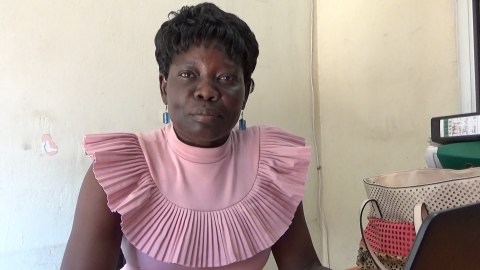Female Journalists Venture into Murky Waters
 Submitted by jbimokola on
Submitted by jbimokola on

At a great risk personally and to their families, a few female journalists in South Sudan continue to practice journalism even as they are looked down upon at by their husbands.
In the population of twelve million people, there are only 75 female journalists, according to writer and author, Sally Armstrong. Most of the female journalists occupy lower in the media, and are coordinated by their umbrella organization, Association of Media Women in South Sudan (AMWISS).
Anna Nimiriano is the only practicing female journalist occupying a top position in the media industry, as manager and editor-in-chief of the Juba Monitor.
Nimiriano is planning to hire a female columnist and add two women journalists to her team of seven reporters. She describes what happened when her newspaper published an incorrect photo of a military general. Men arrived at her office and threatened, “We will take you to a place where you won’t know yourself” — meaning they would kill her, Nimiriano revealed in an interview with Journalist Dominic Kango in May.
Nimiriano is quoted by Armstrong as saying that she was once at her desk when the soldiers came to take her away.
“You will come with us now. The mayor is angry about a column in your paper today. He told us to bring you to him,” she said.
For female journalists, says Nimiriano, it is discouraging because they are vulnerable. “They are not able to defend themselves. Myself as an editor-in-chief, I receive threats even in my office and I feel vulnerable because I can’t defend myself,” she revealed.
Such is the environment for female journalists in a country that has virtually had no peace since it became independent in July 2011.
According to Peter Mwai who worked in South Sudan for over ten years before relocating to Kampala, Uganda to edit PML Daily, an online news source, there are only two female journalists that are allowed to report at parliament in Juba and they are highly protected by the state. Mwai says it is also hard to find a female among ten male journalists
“Female journalists are not allowed to cover stories outside because of the hostile environment and a long time perception that women are a weaker sex. They stay in the newsroom but only those who are brave and aggressive have taken this task,” Mwai revealed.
The task for the female journalists is huge to alter the status of women as well as the course of the civil war with their reporting. They live with daily uncertainty and the chilling risk that they could be sent to a place where they won’t know themselves.
Nimiriano, however, encourages journalists, including her female colleagues, not to fear and to take threats as part of the challenges. She calls of resilience, bravery and being aggressive to practice journalism.
- Log in to post comments
- 756 reads
